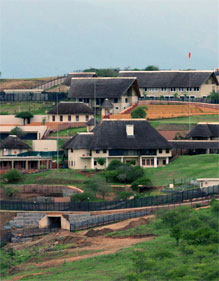|
Getting your Trinity Audio player ready...
|
 Dear CW
Dear CW
Parliament has appointed an ad hoc committee to consider the public protector’s Nkandla report before the elections. What exactly does this mean? What powers does this committee have and what is Parliament’s role in relation to the public protector?
Wondering
Dear Wondering
The speaker established an ad hoc parliamentary committee on 9 April under the rules of the National Assembly “to consider the submissions by the president in response to the public protector’s report and make recommendations, where applicable”.
You may recall that the public protector’s Nkandla report required President Jacob Zuma to report to the National Assembly on his comments and actions on the report within 14 days.
The president tabled his response on 2 April. In it, he indicated that there was an ongoing investigation by the Special Investigating Unit into the security upgrades at Nkandla and that he “will provide Parliament with a further report on the decisive executive interventions that he would consider to be appropriate” after he received its report.
The ad hoc committee’s task will be to consider the adequacy of the president’s response to the Nkandla report. The committee has the power to make recommendations, but it will be up to Parliament to decide how it acts on them.
It can summon people to appear before it and produce documents; receive representations or submissions from interested parties; and conduct public hearings.
Not much time
It is unlikely, though, that the committee will exercise any of its powers of investigation. The speaker has given the committee only until 30 April to report to Parliament.
This deadline has prompted an outcry, particularly after the ANC indicated that it required 10 working days to decide who will represent it on the committee. This is the maximum time allowed for such a decision under the rules, but should the ANC take this long, the committee would begin its work only on 23 April 2014.
With all the public holidays in April, this would leave a mere four working days for the committee to complete its task.
The committee will comprise seven MPs from the ANC, two from the Democratic Alliance, one each from the Congress of the People and the Inkatha Freedom Party, and another representing smaller parties. COPE has indicated that it will not participate in the committee, because it believes it undermines the status of the public protector and is unconstitutional.
Although COPE’s scepticism may be justified, we do not agree that the committee is unlawful. The Public Protector Act of 1994 specifically permits “the discussion in Parliament” of matters investigated by the public protector.
Not necessarily bound by Madonsela’s findings
Parliament’s role in relation to the public protector is a matter of some legal uncertainty: there is awkward wording in the Constitution and the act and the scope of the institution’s powers is yet to be tested in a court.
The public protector has the power (following an investigation into and report on maladministration) “to take appropriate remedial action” — but it appears she does not have the power to compel other organs of state to do so.
The act adds a further complication. It prohibits persons from wilfully obstructing or disobeying the public protector, but only in the course of an investigation. The act does not expressly prohibit noncompliance with an instruction from the public protector made upon her findings.
It is notable that the public protector, advocate Thuli Madonsela, interprets the powers of her office as being limited to making recommendations to public officials.
If this is correct, then Parliament and its ad hoc committee do not need to agree with her directions on the remedial steps that the president must take.
Parliament is obliged to consider her report, but it is not bound by it.
• This article was first published in Sunday Times: Business Times


